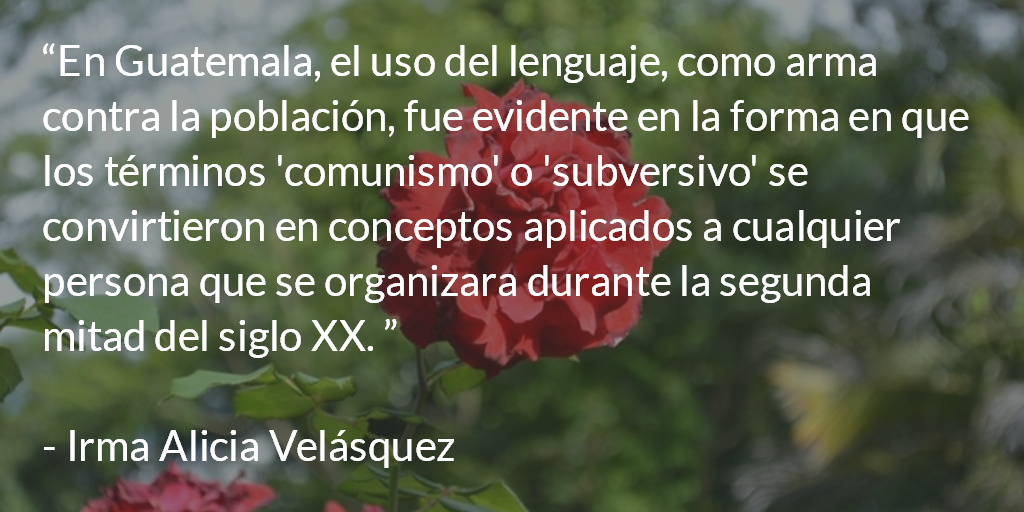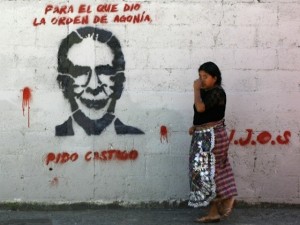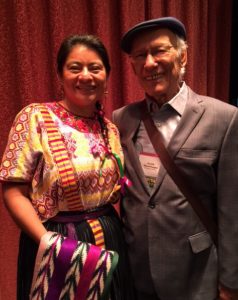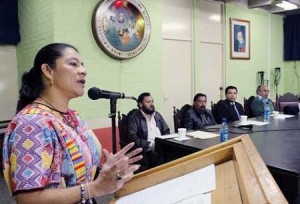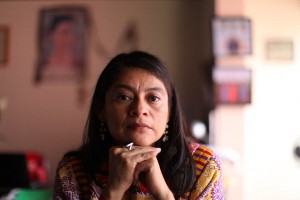
Irma Alicia Velásquez Nimatuj is a journalist, social anthropologist, and international spokeswoman she has been at the forefront in struggles for respect for indigenous cultures. She was Executive Director of the Mecanismo de los Pueblos Indígenas Oxlajuj Tzikin (Support Mechanism for Indigenous Peoples) (2005-2013). Dr. Velásquez Nimatuj is the first Maya-K’iche’ woman to earn a doctorate in Social Anthropology and she initiated the court case that made racial discrimination illegal in Guatemala. She has won numerous academic fellowships and awards for her journalism, She was a member of the Latin American Consulting Group of Indigenous Leaders for UNICEF and participates in the UN through the Permanent Forum on Indigenous Issues. She also served as an advisor on indigenous issues for the Latin American and Caribbean office of UN Women (2014-2015). She is the author of Pueblos Indígenas, Estado y Lucha por Tierra en Guatemala (AVANCSO 2008) and La pequeña burguesía indígena commercial de Guatemala Desigualdades de clase, raza y género(AVANCSO-SERJUS 2002). She writes a weekly newspaper column in elPeriódico de Guatemala and through both her political and academic efforts seeks to create viable and realistic ways to create equality for indigenous people and a truly democratic and participatory democracy in Guatemala.
anthropologist IRMA ALICIA VELÁSQUEZ NIMATUJ receives the MARTIN DISKIN prize
This is the acceptance speech of Irma Alicia Velásquez Nimatuj, Edward Laroque Tinker visiting professor at the Center for Latin American Studies at Stanford University upon receiving the Martin Diskin Lectureship Award on May 15th, 2020. The award was presented by the Latin American Studies Association and Oxfam Americas (LASA / Oxfam) during its international congress LASA 2020.
The speech refers to how the Covid-19 pandemic serves as a warning and call for action for current generations. Emphasizing that if we fail to build alternatives to the current system, governed by voracious, ruthless, and extractive capitalism, it will rob our descendants of a future.
It also addresses how, the historical moment that we are living revealed that the extreme levels of inequality are not only found in the marginalized and excluded neighborhoods of the so-called “third world” countries, but also in the academic and institutional worlds that we inhabit, many of them here in the “first world”.
In speaking of and honoring activism, inclusion, social justice, human rights and the generation of knowledge at the service of humanity–issues that Martin Diskin defended during his life and career– the speech stressed that this moment also requires rethinking how our institutions, universities, departments and even conferences are organized. This is important because often, western institutions exclude intellectuals who are truly committed to social change or those who do not have academic degrees, and as well as local leaders who literally give their lives to defend the survival of their peoples. Therefore, revealing the long path of decolonization is still necessary in the academic world.
The speech concludes by stating that indigenous ancestral awareness and cultural practices are important, because communities know exactly what to do in the face of the crisis: plant and harvest their own food, as they have done for four thousand years. Solutions that indigenous communities have advocated for centuries and that are part of the way of life but that have also served as a source of conflict and violence against them in this neoliberal era.
Academic Article: METHODOLOGICAL CONSTRUCTION OF ACCOMPANIMENT AMONG MAYA-ACHI WOMEN, GENOCIDE SURVIVORS, AND RESEARCHERS FROM COMMITTED ACADEMIA
This work is the result of a journey and collaborative project between a group of thirty-five Maya-Achi women, from different communities of the department of Baja Verapaz in Guatemala and a group of women researchers from Guatemala, Colombia, and Mexico. Scholars from various areas of academia have tried to build a methodology of accompaniment that will support the Achi women, all survivors of the genocide that destroyed their communities between 1975 and 1986, on their long journey for achieving justice for the crimes of genocide, sexual violence, and crimes against humanity committed by the State against them, their bodies, families, and communities.
This research proposal won the Berta Cáceres Award, “La lucha de las mujeres por la igualdad en América Latina y el Caribe” convened by CLACSO in 2017.
Academic article: Struggles and Obstacles in Indigenous Women’s Fight for Justice in Guatemala
CARLOS GUZMÁN BÖCKLER (1930-2017)
 Este articulo fue escrito en memoria de Carlos Guzmán Böckler. Uno de los primeros sociólogos y abogados guatemaltecos que desafió su clase social y escribió uno de los análisis clásicos, Guatemala una interpretación histórica social (1980), que por primera vez reconocía que en Guatemala el problema fundamental no era solo la opresión de clase sino una combinación entre la división de clase y el racismo histórico que invisibilizaba a la mayoría de la población indígena de Guatemala.
Este articulo fue escrito en memoria de Carlos Guzmán Böckler. Uno de los primeros sociólogos y abogados guatemaltecos que desafió su clase social y escribió uno de los análisis clásicos, Guatemala una interpretación histórica social (1980), que por primera vez reconocía que en Guatemala el problema fundamental no era solo la opresión de clase sino una combinación entre la división de clase y el racismo histórico que invisibilizaba a la mayoría de la población indígena de Guatemala.
ARTICULO ACADÉMICO: EL GENOCIDIO FRENTE A LA MEMORIA – PLAZA PUBLICA
In this article, Irma Alicia Velasquez shares her experience of following the legal process of the genocide trials against former dictator Efrain Rios Mont (1982-1983), answering questions such as: What symbolizes this trial, sentencing, annulment, and what was stirred around? Is Guatemala the same after this process?
JOURNALISTIC ARTICLE: A Rodolfo Stavenhagen
This article is in memory and to celebrate the life, contribution, and struggles of Rodolfo Stavenhagen.
JOURNALISTIC ARTICLE: EL LEGADO DEL GOBIERNO DE OTTO PÉREZ MOLINA Y ROXANA BALDETTI ELÍAS A LOS PUEBLOS INDÍGENAS DE GUATEMALA
This is a general analysis focused on how government policies of Otto Pérez Molina and Roxana Baldetti Elias affected Indigenous Peoples of Guatemala. Considering that this accounts for just over 60 percent of the total population, this is results in a country analysis. The need for this reflection lies within the face of political uncertainty, in the failure of the democratic system, the failure of political parties reflected in the corrupt and criminal actions of the leadership of the Patriot Party. To pave new roads for a nation, we must be aware of the past. In this context, the last three and a half years of this government require serious reflection to understand the mistakes that, after overcoming this crisis, must be avoided.
